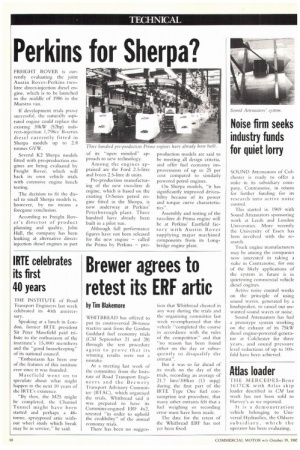Perkins for Sherpa?
Page 20

If you've noticed an error in this article please click here to report it so we can fix it.
FREIGHT ROVER is currently evaluating the joint Austin Rover-Perkins twolitre direct-injection diesel engine, which is to be launched in the middle of 1986 in the Maestro van.
If development trials prove successful, the naturally aspirated engine could replace the existing 39kW (52hp) indirect-injection 1,798cc B-series diesel currently fitted in Sherpa models up to 2.8 tonnes GVW.
Several K2 Sherpa models fitted with pre-production engines are being evaluated by Freight Rover, which will back its own vehicle trials with extensive engine bench testing.
The decision to fit the diesel to small Sherpa models is, however, by no means a foregone conclusion.
According to Freight Rover's director of product planning and quality, John Hall, the company has been looking at alternative directinjection diesel engines as part of its "open minded" approach to new technology.
Among the engines appraised arc the Ford 2.5-litre and lyre° 2.5-litre di units.
Pre-production manufacturing of the new two-litre di engine, which is based on the existing 0-Series petrol engine fitted in the Sherpa, is now underway at Perkins' Peterborough plant. Three hundred have already been built in a pilot run.
Although full performance figures have not been released for the new engine — called the Prima by Perkins — pre production models are said to be meeting all design criteria, and offer fuel economy improvements of up to 25 per cent compared to similarly powered petrol engines.
On Sherpa models, "it has significantly improved driveability because of its power and torque curve characteristics".
Assembly and testing of the two-litre di Prima engine will be at Perkins' Eastfield factory with Austin Rover supplying major machined components from its Longbridge engine plant.




































































































